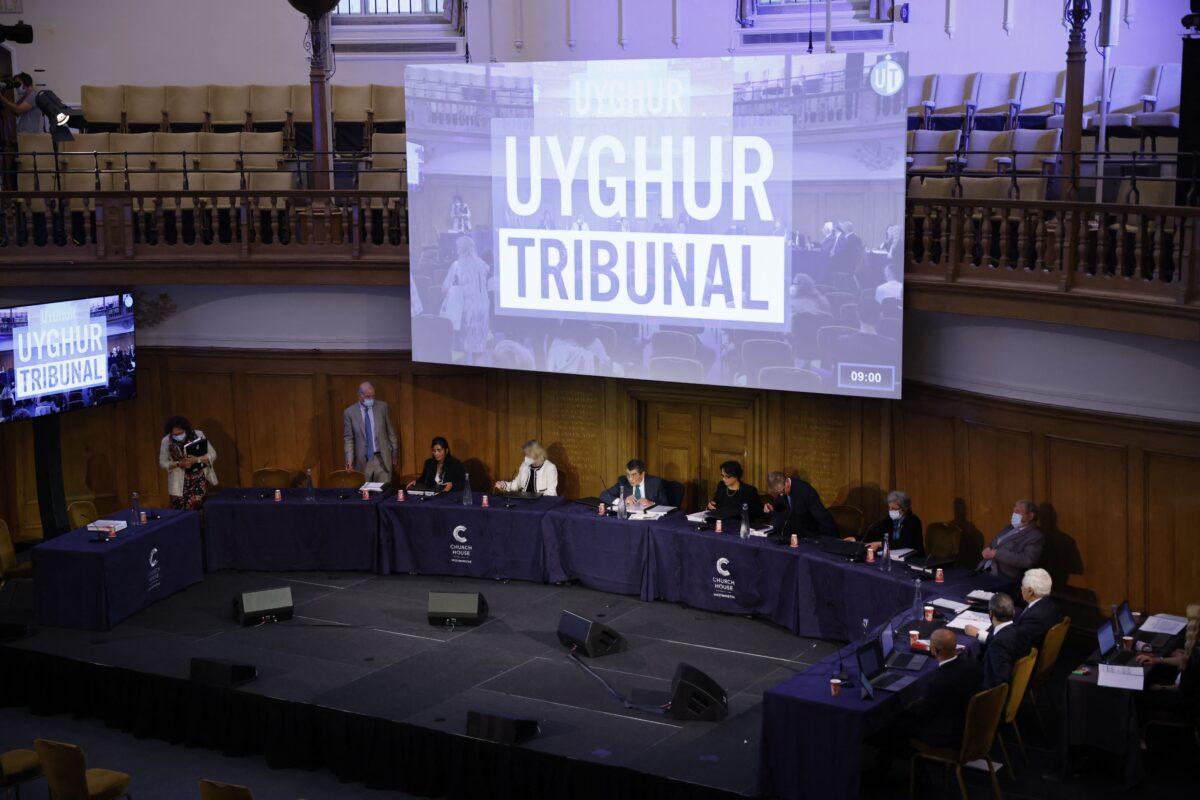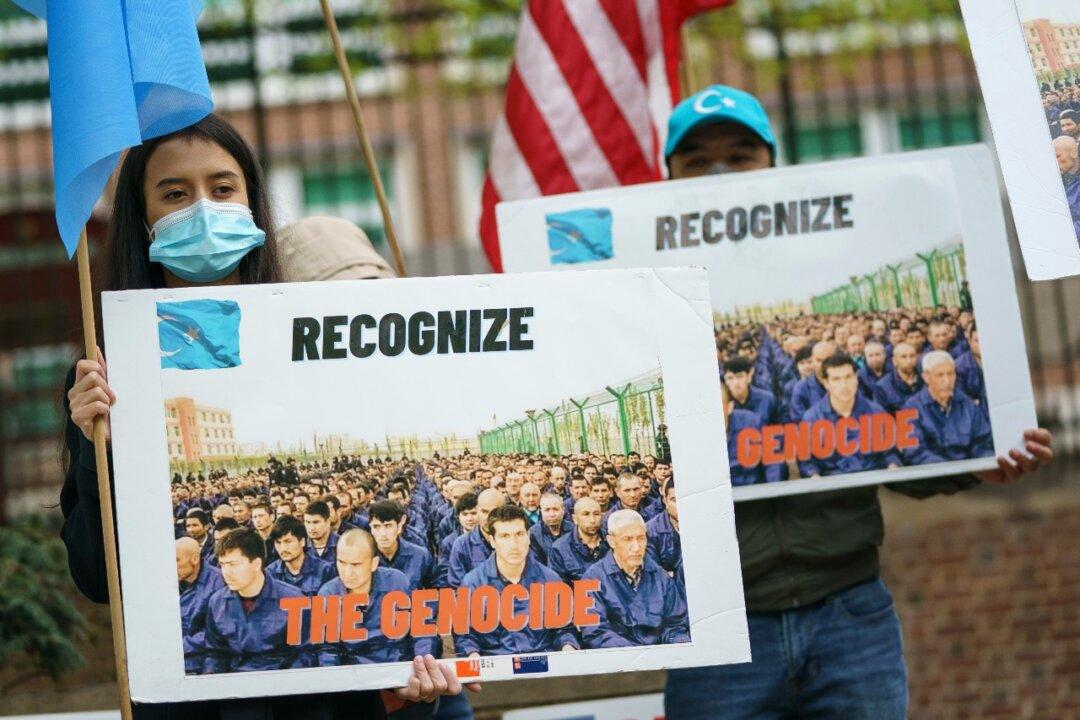A London-based independent people’s tribunal on Dec. 9 ruled that the Chinese regime has committed genocide against Uyghurs and other Muslim minorities in the far west Xinjiang region.
The Uyghur Tribunal found that the Chinese Communist Party (CCP), through an array of repressive acts including mass internment, family separation, sterilizations, and forced labor, has implemented “deliberate, systematic and concerted policy” to lower the Uyghur population in the region.
The findings come amid heightened condemnation over the CCP’s human rights abuses in Xinjiang and elsewhere in the lead-up to the 2022 Beijing Winter Olympics. In recent days, the United States, Canada, Britain, Australia, and Lithuania have announced diplomatic boycotts of the Games over this issue. The United States and the parliaments of several Western countries have already designated Beijing’s repression in Xinjiang as a genocide.
Reading from a 60-page document, Geoffrey Nice, the chair of the tribunal, enumerated the many ways in which the CCP and its functionaries in western China have deprived Uyghurs of rights and subjected them to abuses rising cumulatively to the level of genocide. Nice focused on the abuses of Uyghur prisoners in Xinjiang.
The legal basis for this classification lies largely in the precedent set by the Convention on the Prevention and Punishment of the Crime of Genocide, an international treaty adopted by the United Nations General Assembly on Dec. 9, 1948.

Unspeakable Treatment
The mass detainment of Uyghurs sets the stage for myriad forms of abuse, humiliation, torture, and extrajudicial killing. Nice cited the testimony of witnesses at the tribunal’s hearings in June and September in support of this determination.“Hundreds of thousands of Uyghurs, with some estimates well in excess of a million, have been detained by PRC [People’s Republic of China] authorities without any, or any remotely sufficient, reason, and subjected to acts of unconscionable cruelty, depravity, and inhumanity,” he said.
As many as 50 detainees at a time have been crammed into cells of 22 square meters, with not enough space to lie down on the floor, forced to relieve themselves in buckets in full view of other prisoners and CCTV, and subjected to torture methods such as pulling off of fingernails and being beating with sticks. Officials have detained them in chairs where their feet or hands are held in place for hours or days, and confined them in containers up to the neck in cold water. Some have been shackled by heavy metal weights for months on end, Nice said.
Rape and sexual violence are common. One young woman, Nice said, underwent gang rape by policemen in full view of a hundred other prisoners, as a way to send a message of what would happen to them or others if they stepped out of line. The insertion of electric shock rods into the orifices of female prisoners is also common, Nice said. Withholding of food to punish or humiliate is another common method of torture and humiliation.
The cumulative effect of these different forms of mistreatment and torture amounts to genocide, Nice said. Some might try to dismiss the charge of genocide and to maintain that what’s really going on in western China is a long-running attempt to get the Uyghurs to assimilate to mainstream Chinese society, Nice said. But Nice and his colleagues don’t credit such arguments at all.
The Genocide Convention of 1948 took as its purpose the survival of national, ethnic, and religious groups, as opposed to individuals, and the taking of action in foreign countries to prevent those groups’ extermination, Nice said. That aim is just as important in 2021 as it was at the time of the convention’s launch, he said.
“Some might say what is happening in Xinjiang is merely the encouragement to assimilation of groups, assimilation being something that has happened naturally throughout recorded history, and that the PRC might simply be bringing greater security and borders to a country of a single character,” Nice said.
Such thinking is deeply wrong, he said. Whether attempted through encouragement or through force, mass assimilation nullifies the value of diversity manifesting in all the myriad ways humans live and behave, he said.
Calling Genocide by Its Name
Politicians and private citizens who have spoken out in support of the Uyghurs may have done so for one of any number of motives, Nice said, including envy of China’s success or fear of China, but whatever the reason, it’s clear that such support has been more than warranted. It’s the continuing advocacy and activism of such concerned people and organizations that may ultimately prove effective in addressing the human rights crisis. Though the non-official tribunal itself can make recommendations, its powers are limited.“The tribunal has no power of any kind to sanction the PRC or individuals in the PRC. It assumes that politicians, civil society, NGOs, and powerful individuals who have powers of sanction, and who can make their voices heard on issues to which this judgment may relate, will do so,” Nice said.
Much of the information presented in the hearing has been publicly available for some time, he said. While the United States, the EU, and other powers have taken some action on the Uyghur issue, what their actions and statements to this date have lacked is an explicit appeal to the mission and purpose of the Genocide Convention.
Now that the tribunal has publicly aired its judgment, Nice said, it’s to be hoped that all parties demanding action on the crisis from this point forward will call the persecution of the Uyghurs by its proper name and demand an end to the genocide.





